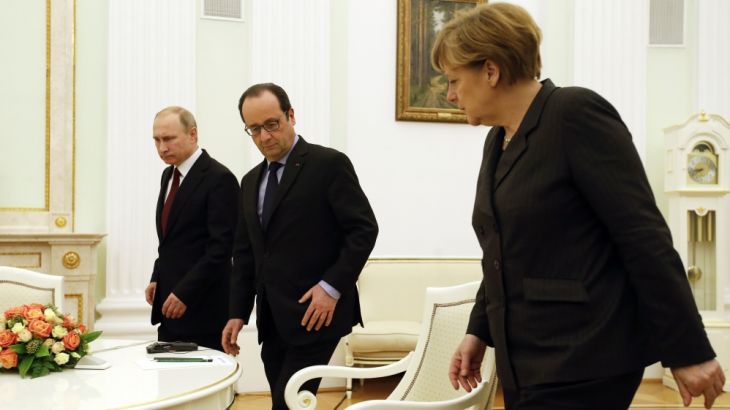Merkel and Hollande discuss Ukraine crisis with Putin
Russia and Germany vow to work on possible joint document on restoring Minsk deal to end fighting in eastern Ukraine.

The leaders of France and Germany have departed from Moscow after five hours of talks with Russian President Vladimir Putin, with little to announce to end fighting in Ukraine beyond a promise to keep talking.
None of the leaders spoke publicly after Friday’s meeting, which ended around midnight with President Francois Hollande and Chancellor Angela Merkel going straight from the Kremlin back to the airport.
The French and German leaders had held similar late talks the night before with Ukrainian President Petro Poroshenko, part of a last-ditch push for a breakthrough before EU leaders consider new financial sanctions against Russia next week.
European officials had played down expectations before the Moscow talks, expressing doubt that Putin would compromise while pro-Russian rebels are advancing on the ground.
Afterwards, Russia and Germany both described a commitment to work on a “possible joint document” on restoring a collapsed peace deal signed last September in Minsk, Belarus.
The document would include ideas proposed by the leaders of France, Germany, Russia and Ukraine, who would all speak in a conference call on Sunday.
After the talks ended, Dmitry Peskov, Putin’s spokesman, said: “Work is currently under way on drafting the text of a possible joint document on the implementation of the Minsk agreement, which would include the proposals made by the president of Ukraine and President Putin.”
Tense atmosphere
In a sign of the tense atmosphere, Merkel and Hollande had gone straight into the Kremlin for the talks without the usual diplomatic niceties of a welcoming handshake for the cameras.
They emerged only for a stiff photo opportunity.
The West accuses Russia of backing an advance in recent weeks by rebels fighting for territory Putin has called “New Russia”, which ruined the Minsk deal, reviving a conflict that has killed more than 5,000 people.
|
|
Russia denies it is involved.
On the ground, a brief truce was organised on Friday so trapped civilians could reach safety from Debaltseve, a government-held railway hub between the two main rebel-controlled cities of Donetsk and Luhansk.
Both sides sent convoys of buses, giving residents a choice to evacuate to government or rebel territory.
The government buses left full; the rebel buses left mostly empty.
Dozens of buses drove in from both rebel-held and government territory to carry away residents who had been trapped in the crossfire without power, heat or running water for two weeks.
Even as the evacuation was taking place, Debaltseve’s army defenders kept up regular howitzer and mortar fire at separatists beyond the town’s perimeter.
In the centre, dozens of soldiers in full battle gear mingled with civilians waiting either to receive humanitarian aid or board the buses out.
‘Little hope in talks’
To the west, artillery duels between the rebels and government forces rumbled through Donetsk.
Al Jazeera’s Charles Stratford, reporting from Donetsk, said shelling continued throughout the night, and into the morning on Friday.
“The people continue to live in fear,” he said. “There’s very little hope in these talks.”
Western countries accuse Putin of sending funds, heavy weapons and troops to back pro-Russian separatists who launched an offensive in January, when a five-month-old truce finally collapsed.
Russia denies assisting the rebels.
Since launching their offensive, the rebels have made major advances and acted in response to heavy shelling by Ukrainian government forces.
|
|
The Kiev government and its Western allies want any new ceasefire to require the rebels to give up those new gains.
A statement on Poroshenko’s website after Thursday night’s talks in Kiev said the sides had expressed the hope that Russia had an interest in a peaceful solution.
Arseny Yatsenyuk, Ukrainian prime minister, in Kiev made an all but direct pitch for military help.
“Peace in Europe depends on peace in Ukraine and for us to achieve that peace Ukraine must have the means to defend itself,” he said.
Ukraine wants “lethal” aid such as anti-tank weapons to help it fight the heavy battle tanks it says the rebels have received from Russia, as well as “non-lethal” equipment such as night vision goggles and radar to detect where artillery is fired from.
This week, the US has begun openly hinting it could arm Ukraine’s military.
US General Philip Breedlove, the top military commander in NATO, implied that he favoured sending weapons, telling a security conference in Munich that the West should use “all the tools in the toolbag”.
However, Ursula von der Leyen, German defence minister, said: “Are we sure that we would be improving the situation for the people in Ukraine by delivering weapons? Are we really sure that Ukraine can win against the Russian military machine?”